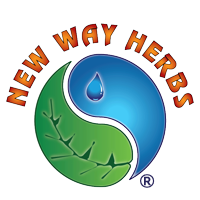There’s an Herb for That…
Welcome to New Way Herbs newsletter. This will be the first in a series that will answer some of your questions and enhance your understanding of our products and their benefits. Let’s begin by exploring advantages of tinctures over other herbal sources. While growing fresh organic herbs in your garden and making a fresh tea or infusion would be the ideal situation, it is not practical for most of us. So, what is the most efficient way to absorb the herbs you need? Here are some things to consider.
There are basically three ways to deliver herbs into your system; dried powdered herbs, capsules or liquid tinctures. Freshly dried powders can be a useful source, but they tend to lose potency over time, making them less effective and requiring higher dosage amounts. Capsules that are plant based will absorb into the digestive system, but if binders are present they may be less absorbent or possibly contain allergens that may adversely affect you. Tinctures, made of the highest quality certified organic herbs, that are picked and processed at peak potency, will maintain quality over time and offer a high absorption rate. A non-alcohol glycerin version, though with a shorter shelf life, offers a sweeter taste.
Here is a synopsis of different available capsules and the efficacy of each.
Gelatin capsules are probably the most available form on the market. Derived from hydrolysis of collagen extracted from animal connective tissue, it is primarily a gelatin made from bones and skin of cattle, and pigs. The herbs go through a pretreatment with an acid (usually acetic acid) or an alkali, gelatin extraction, purification and drying.
An alternative form of capsules, made from fish gelatin, comes from the skin, bones and fins, primarily from farm raised fish, which usually contain a higher level of toxins and lack the healthy essential fatty acids found in the wild, cold water fish. The process of extraction is similar to mammal sourced gelatin, though additional enzymes or salts may be added. Herbs in this form should be refrigerated.
Vegetarian capsules are starch-free, gluten-free and preservative-free, and meet the strict dietary needs of vegetarians. The capsules are made from Hypromellose, a wood pulp. manufactured using mechanical, semi-chemical or fully chemical methods. Most wood pulp is manufactured in China. Although Hypromellose is considered non-toxic, there has been little study of its affect upon ingestion.
Soft gel capsules are usually made from a gelatin, starch or carrageenan. The herb is heated when sealed and may damage the ingredients.
Conversely, the process of creating a tincture begins by extracting herbs in alcohol and water, the preferred method to preserve the widest range of constituents from the herbs. The amount of alcohol in the finished extract is minimal. A single dosage contains no more alcohol than you would consume in a ripe banana peel. To produce the non-alcohol version, Glycerin, a syrup derived from coconuts, is added to the mixture to replace the alcohol. The alcohol is slowly removed, without destroying the integrity of the formula, and replaced with glycerin, which is derived from coconuts. The glycerin acts as a natural preservative and gives the tincture a more palatable taste. There are no animal products, or toxins, or chemicals used in the process. An alcohol-based tincture can have a shelf life, when kept in a cool dark location, of up to 10 years or more, while a non-alcohol, or glycerin base tincture can last 2-3 years. Herb products should have a Certificate of Authenticity available and be tested for contaminants; such as heavy metals.
Finally, always look for the potency ratio when purchasing herbs, and especially tinctures. Pricing can be deceiving. You may pay the same amount for a one-ounce bottle of herbs only to discover that one lasts a week, while the other lasts a month, based on its potency ratio. Our herbal tinctures are a 1:4 or 1:2 ratio; dependent on the source; i.e. herbs that are dry cut and sifted versus herbs that are in powder form. A 1:2 tincture is likely to be five times as strong as a 1:10 tincture, and a 1:4 two-and-a-half times stronger than a 1:10. The lower the number within the ratio, the greater the difference in the amount of herb used in the extract. Because tinctures are so concentrated the recommended dosage is much less. A dried herb tea solution may recommend 4-5 cups of a day, while other herbal sources may recommend much higher dosages to achieve the same therapeutic benefit as a few little squirts of tincture each day.

Comments are closed here.